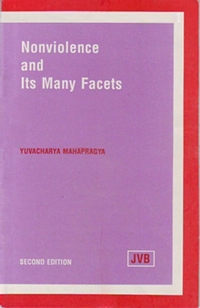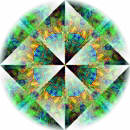
The question arises as to how violence was born in man. His forbears - the primates - had already learnt the art of living together. Some other mammals had learnt it earlier. Then when and how did man become violent? This is an unanswered question.
Man too is a social animal. He lives in society together with other fellow beings. But social life by its very definition implies a life of inter-relatedness. These relations have multiple bases. To satisfy his sex instinct man built the institution of the family and new relations came into being. He made friends to indulge his feeling of affection. His ego gave him a feeling of exclusiveness. More new relationships were born. But all of them were based on the utility principle. By themselves they have produced what might be called practical non-violence. Members of the family and friends do not normally fight with or torment one another. But is it true non-violence? It certainly is not, for even the slightest case involving selfish interests explodes the relationship. This is true of husband-wife, brother-brother and all such relationships. Examples are not lacking where one has even murdered the other. Thus we must distinguish between what we have called practical non-violence and true spiritual non-violence, since the former is based on selfishness. It works through our behaviour only so long as our selfish interests are not threatened. Thus it is clear that merely because man is a social animal, he cannot be regarded as a supporter of a non-violent society.
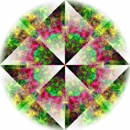
The question - 'How was violence born in man?' if seen in the above light turns out to be basically faulty. It (the question) is the result of a wrong understanding. When our as well as society's entire life style is based on practical non-violence, on the slightest pretext violence can flare up anywhere in the family, between communities, castes and sects. Those researching into non-violence have, I am afraid, not fully grasped this truth. That is why they keep asking the questing: 'How was violence born in man?' For a proper understanding of the whole matter, they have to first understand the concept of spiritual non-violence. Merely living together on the basis of practical non-violence is no guarantee of true and lasting non-violence.
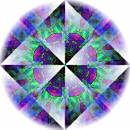
There are many factors responsible for violence. We will go into them a little later. The point to be noted here is that the violence prevalent in society cannot be put an end to without developing spiritual non-violence and basing our life style on it. Let us then discuss what is meant by spiritual non-violence. It is based on the unity and equality of all souls - souls of all sentients. Once we know that every living being is subject to pain and pleasure in the same manner as we and that therefore we must never inflict any pain on them, never oppress and exploit them, never rob them of their rights, we are on our way to realizing the meaning of spiritual non-violence. And it is only this non-violence that can prevent the arson, loot, rioting and killings going on in society.
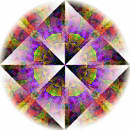
Everyone is familiar with Tamerlane, the cruel despot. He thought he could change the people using savage force and punishment, little realizing that it is only change of heart that can do so. Once three men were brought to him, of whom the first two were put to death. The third turned out to be the poet Ahmed. He asked the poet to evaluate the price of the two men who had been killed. Ahmed said they were each worth 500 sovereigns. 'How about me?' asked Tamerlane. The poet said that he was worth only 2 sovereigns. This infuriated the tyrant. He said that this costume alone was worth the money quoted. Ahmed replied that was exactly what he had evaluated, for as far as Tamerlane was concerned he was worth nothing, he being a man without any sympathy, kindness and feeling for justice.
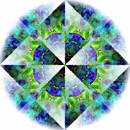
The story has a lesson to teach. For evaluating somebody's or something's true worth the behavioural angle is utterly misleading, because it can evaluate only external things and attributes. Inner worth is best assessed spiritually. As far as non-violence is concerned, we talk profusely but think very little about it. Talk we have to, because it is recognised by everyone that non-violence is essential for a happy and peaceful life. Unfortunately the above consciousness is confined to practical non-violence, which, as we have seen, works on the utility principle. Spiritual non-violence has been all but ignored and so we have not experienced the unity and equality of souls.
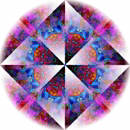
Preksha Meditation enjoins its practitioners to perceive the soul by the soul, which also means that the tendency to look at the utilitarian style of living must be eschewed and the ability to look at the spiritual style must be cultivated. Sadly enough, we are in the habit of seeing, recognizing and knowing only the practical aspect and we have completely neglected the spiritual aspect. This is so because we have never understood the true meaning of non-violence. We must see both the aspects - the practical as well as the spiritual. The former is responsible for our laying the blame for everything on someone's door. This to my mind has veritably destroyed all possibilities of our understanding true non-violence. When we have closed all openings for spiritual non-violence and have opened all the doors and windows for relationships based on the utility principle, what right do we have to wish the violence to end? The question 'How was violence born?' should not therefore baffle us, for the seeds of violence has made it almost impossible for the people to know and understand true non-violence. Under normal circumstances when we discover amity and fellow-feeling among the members of the same family or community, or among neighbours, we are led to believe that there is plenty of non-violence in society, little knowing that what binds them all together is not so much non-violence as the utility principle. Once this principle comes under strain violence erupts. We have therefore to consider this matter with utmost seriousness.

I believe that practising meditation is a step towards spiritual excellence. To meditate is to see oneself, which in turn means seeing and searching the real base of non-violence. It appears we have misunderstood the meaning of meditation. Had it not been so, we would have given it much greater importance than to mere formal studies. Today people value education because without it, it is not possible to grow rich or get a good partner in marriage. Since they have little or no thought of spiritual goodness, they do not think it necessary to strive for it. If only we had given equal importance to both!

The search for spiritual non-violence is not possible through scientific instruments or history or even genetics. One has to investigate one's soul in order to know one's identity, one's true self. It will reveal to the investigator all those dispositions within him that encourage violence, he will then try to find out whether those dispositions can be neutralized. Such an analysis of the inner self is a prerequisite for the search of true non-violence, because the question of violence and non-violence, even while being related to external factors, is in essence an internal matter. And the root of the matter lies in man's dispositions. Ironically sociologists, economists and psychologists think that it is the general atmosphere or external circumstances that are responsible for the rise of violence. It is held that our behaviour and conduct are governed by circumstances. Metaphorically such an understanding represents a situation in which the root is made to take the place of branches and vice versa. We are thus made to live under an illusion. And the only way to destroy it is the practice of meditation. The deeper one probes Inside, the newer the truths one discovers- truths that defy scientific explanation. We do not regard events that have happened as false simply because science has no explanation for them. Things are happening within us that science cannot explain, but they are all too true. By looking into our inside we can get to know the truth and succeed in striking a balance between the practical and spiritual aspects of life. We shall be able to answer the question how violence was born in man only after we have succeeded in integrating and balancing practical and spiritual non-violence.
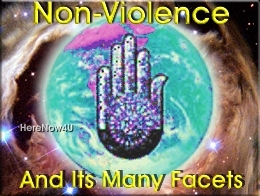
 Acharya Mahaprajna
Acharya Mahaprajna
